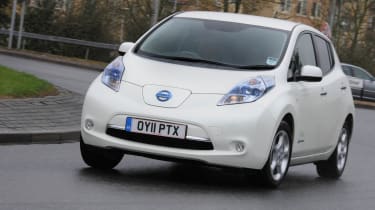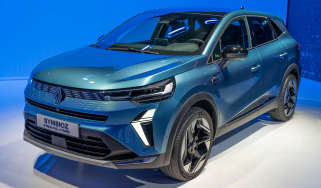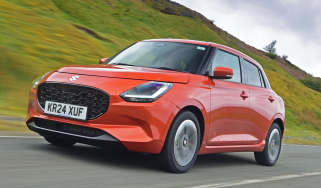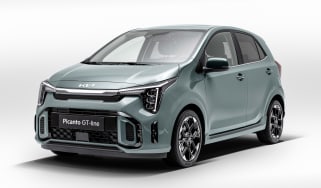Nissan Leaf
Electric hatch compensates for high price with minimal costs. But is it a realistic choice?
It’s got a reputation for flying in the face of convention. After ditching the worthy Almera family hatch, Nissan created a new market sector with the rugged Qashqai. And it repeated the trick earlier this year with the introduction of the Juke – a supermini crossover.
The new Leaf is a much bolder statement, because it’s the technology beneath the skin that separates it from the herd. With a seamless electric drivetrain powered by advanced lithium-ion batteries, it plugs into mains electricity for a top up. As it employs such forward-thinking technology, you could be forgiven for thinking the Leaf looks pretty ordinary. After all, its smooth outline shares the same basic proportions as the more traditional cars in this test.
Video: watch CarBuyer's video review of the Nissan Leaf
[[{"type":"media","view_mode":"content_narrow","fid":"68649","attributes":{"alt":"","class":"media-image"}}]]
With such innovative technology underneath, you can understand why the company has played it safe with the styling. Look closely and there are plenty of futuristic details, though, and these help to set the Leaf apart.
At the front, the low nose suggests the absence of a conventional engine, while the heavily contoured headlamps ease the flow of air around the door mirrors, to reduce drag and slash wind noise in the cabin. Cutting-edge LED tail-lights also give the Leaf an eye-catching appearance.
The conventional approach is extended to the interior. At first glance, there’s not much to upset fans of traditional family hatchbacks. There’s a standard-looking dashboard and, as with the Auris, a quirky gearlever mounted on the centre console.
However, hit the start button and a musical chime sounds as glitzy LCD dials appear out of the previously dark instrument binnacle. Here you’ll find a digital speedometer, as well as a gauge for the battery life and a neat tree graphic that shows how efficiently you are driving.
Elsewhere, the cabin is as practical and spacious as both of its rivals here. The rear bench will seat three adults at a pinch, while opening the tailgate reveals a 330-litre load bay – which has a huge 97-litre advantage over the Auris. Sadly, parts of the electrical powertrain intrude into the luggage compartment, so folding the 60/40 split rear seats boosts capacity to a mere 680 litres.
At present, only top-of-the-range versions are available in Nissan showrooms, which means you get plenty of kit as standard. Climate control, keyless entry and sat-nav are all included in the list price – you’ll have to pay extra to fit these items on the VW and Toyota.
Other additions include a reversing camera and cruise control. There’s even a neat smartphone app that allows you to remotely set the charging times and air-con system. In fact, the only non-standard option is a small solar panel inserted into the tailgate spoiler that charges the 12-volt electrical system.
The Nissan’s lithium-ion battery pack is reserved for the hi-tech electric powerplant. As it delivers a muscular 280Nm of torque the instant you touch the throttle, it’s no surprise to find the Leaf is quick off the mark.
In town, it’s smooth, silent and swift, and a surprisingly nimble companion. And in terms of all-out acceleration, the Leaf is a match for its opponents here – it posted a respectable 0-60mph time of 11 seconds. Better still, at higher speeds there’s still a decent amount of urge in reserve, which means that overtaking is far from a white-knuckle experience.
However, it’s worth bearing in mind that accessing the Nissan’s full performance potential will have an impact on the range – our test model was ready for a recharge after only 49 miles – so it pays to use a light right foot...
Driving gently will be no hardship, because it’s clear that the Leaf’s chassis has been developed with more sedate motoring in mind. The steering is light, with limited feedback, while the nose washes wide earlier when cornering than that of the Golf or Auris. At least refinement is excellent, as there’s virtually no mechanical or wind noise on the inside. Its talents as a comfortable cruiser are damaged only by a firm ride – something it shares with its eco peers in this test.
Once you’ve got past the high asking price, the Leaf makes plenty of sense financially. Low ‘refuelling’ bills (as little as a couple of pounds for a full charge) and free road tax mean it’s an extremely cost-effective option – although the limited range and lengthy charging process will undoubtedly limit its everyday potential for many motorists.
Still, that doesn’t detract from Nissan’s achievement in making an electric-powered family car that can realistically rival the best conventional-engined models on the road.
Details
Chart position: 2
WHY: This Nissan promises to be one of the most exciting and interesting new cars of the year. Does the world’s first all-electric family model live up to the hype?



